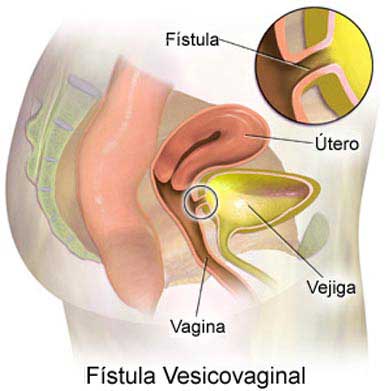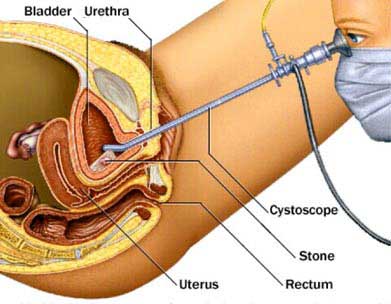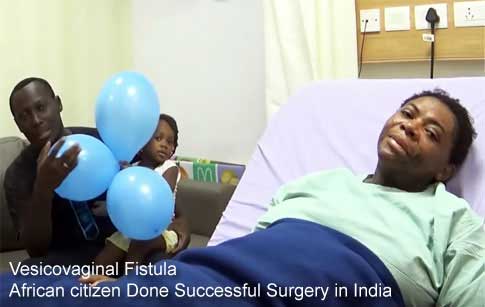Vesicovaginal Fistula Surgery in India |
 |
Vesicovaginal fistula repair is surgery to close or evacuate a fistula between your bladder and vagina. A fistula is an irregular tissue association or opening. Your bladder is an organ at the base of your midriff (stomach) where pee is put away. Your vagina is the opening through which you have your month to month time frame and conceive an offspring. Pee regularly spills out of your kidneys into your bladder through your ureters. From your bladder, pee streams out of your body through your urethra. When you have a vesicovaginal fistula, pee will leave your body through your vagina. When this happens, you won't have the capacity to control the stream of your pee.
Vesicovaginal fistulas may happen in the wake of having surgery to expel your uterus (womb). Fistulas additionally may happen in the wake of having surgery on your urethra. Radiation to treat growth of the cervix (the opening of the uterus) likewise may bring about a fistula. Amid surgery, your parental figure closes or evacuates the fistula to keep pee from spilling. Surgery might be done through your vagina, or through entry points (cuts) in your stomach area. Having your vesicovaginal fistula repaired may diminish your danger for skin diseases and aggravation from spilling pee. Surgery may diminish, or totally stop the spillage of pee through your vagina.
 Cystoscopic view of vesicovaginal fistula Cystoscopic view of vesicovaginal fistula
Vesicovaginal fistulas may happen in the wake of having surgery to evacuate your uterus (womb). Fistulas additionally may happen subsequent to having surgery on your urethra. Radiation to treat malignancy of the cervix (the opening of the uterus) additionally may bring about a fistula. Amid surgery, your parental figure closes or evacuates the fistula to keep pee from spilling. Surgery might be done through your vagina, or through (cuts) in your belly. Having your vesicovaginal fistula repaired may diminish your danger for skin diseases and bothering from spilling pee. Surgery may diminish, or totally stop the spillage of pee through your vagina.
What are the types of Vesicovaginal Fistula?
Depending on the location, cause, complexity, or site of obstruction,
Vesicovaginal Fistula can be classified as : -
A] Simple Vesicovaginal Fistula :-In this kind of Vesicovaginal Fistula, the length of vagina is ordinary, fistula is under 2 cm long and there is no history of radiation or vagina/cervical harm. Basic Vesicovaginal Fistula is entirely straight forward to repair
B] Complex Vesicovaginal Fistula : -In this write, vaginal length is abbreviated, there is history of pelvic harm which may have brought about radiation treatment and is the fistula is more than 3 cm long. The repair of Complex Vesicovaginal Fistula is very convoluted and can represent a test to the specialist.
Reasons for Procedure
A vesico-vaginal fistula repair is done in ladies with a fistula, which might be brought about by:
-
Injury to the urinary tract (eg, amid labor , surgery, or radiation treatment )
-
Previous operation
-
Tumor
-
Crohn's sickness
-
Impaired blood stream because of radiation or long work
Possible Complications
Entanglements are uncommon. In any case, no system is totally free of danger. In the event that you are wanting to have vesico-vaginal fistula repair, your specialist will audit a rundown of conceivable intricacies, which may include:
-
Urinary tract contamination or different diseases
-
Irritation or aggravation of the vulva (the opening of the vagina)
-
Injury to bladder, vagina, or urethra (the tube that conveys pee outside of the body from the bladder)
-
Bleeding
Adverse response to anesthesia (eg, low circulatory strain, wheezing) Factors that may increase the risk of complications include:
-
Smoking
-
Obesity
-
Taking blood-thinning medicines
-
Fistula that is large or complex
-
Already having an infection or chronic inflammation
Discuss these risks with your doctor before the procedure.
What to Expect
Prior to Procedure
Your doctor may do the following:
-
Physical exam, blood and urine test, and imaging tests
-
Discuss with you the type of anesthesia that will be used and the potential risks
 Talk to your doctor about your medicines. You may be asked to stop taking some medicines up to one week before the procedure, like: Talk to your doctor about your medicines. You may be asked to stop taking some medicines up to one week before the procedure, like:
-
Aspirin or other anti-inflammatory drugs
-
Blood thinners (eg, warfarin , clopidogrel)
Other things to keep in mind prior to the procedure:
-
Arrange for a ride home from the hospital.
-
If instructed by your doctor, avoid food or drinks for 6-8 hours before the procedure.
Anesthesia
-
General anesthesia will be used. It will block any pain and keep you asleep through the surgery. It is given through an IV (a needle placed in your arm).
Description of the Procedure
-
You will be prepared for surgery. IVs will be placed in your arm or hand for medicines and fluids. The surgery can be done through the vagina or through an incision in the abdomen.
Transvaginal
Once you are asleep, the doctor will insert a catheter (tube) into the urethra. A speculum (used to hold the vagina open) will also be placed in the vagina. The doctor will locate the fistula. The walls of fistula will be cut away. The fistula will be closed with sutures. Special dressings will be placed in the vagina.
-
Transabdominal: A little cut will be made in the lower belly. Once the fistula is found, its covering will be cut and evacuated. The tissue will be controlled so that there is no more an association between the urinary tract and the vagina. The vaginal divider and mass of the urinary tract will be repaired. The stomach divider will be shut. Catheter tubes might be left set up after the technique to deplete pee. The specialist may likewise put stents (a kind of catheter) in the ureters (the tubes that convey pee from the kidneys to the bladder).
Immediately After Procedure
You may have a temporary catheter in your urethra when you wake up.
How Long Will It Take?
1- 3 hours or longer, depending on complexity
How Much Will It Hurt?
Anesthesia prevents pain during surgery. Pain or soreness during recovery will be managed with pain medicine.
Average Hospital Stay
This procedure is done in a hospital setting. The usual length of stay is:
-
1-2 days for a simple repair
-
3-5 days for a complex repair
Your doctor may choose to keep you longer if complications arise.
Post-procedure Care
At the Hospital
After the procedure, the hospital staff may do the following:
-
Monitor you while you recover from the anesthesia.
-
Help you gradually begin to eat and move around.
-
Give you pain medicine.
-
Take care of your catheter. The catheter will likely be in place for several weeks.
 At Home At Home
When you return home, do the following to help ensure a smooth recovery:
-
Take medicines to treat pain and bladder spasms and to reduce infection.
-
Avoid lifting heavy objects and doing strenuous activity for several weeks.
-
Drink plenty of fluids (eg, 8-10 glasses per day).
-
Do not drive or have sex until your doctor says that it is safe to do so.
-
Be sure to follow your doctor’s instructions.
Call Your Doctor
After you leave the hospital, contact your doctor if any of the following occurs:
-
Increasing pressure or pain
-
Redness, soreness, bleeding, or discharge at or around the incision site
-
Changes in frequency, odor, appearance, or amount of urine
-
Unable to urinate
-
Signs of infection, including fever or chills
-
Excess blood in urine (Small amounts are normal.)
Benefits
In addition to the medical benefit from the repair of Vesicovaginal Fistula, you will also experience a profound effect on your emotional well-being. The offensiveness from incontinence of urine can result in social alienation, ostrasization and immense emotional trauma. Surgical repair of Vesicovaginal Fistula can help you once again become part of the mainstream population.
|
 |
|
|
|





